Artificial Intelligence
Industry Standards


A thorough strategy execution that supports Dr. Kaplan and Dr. Norton's Execution Premium methodology is fruiStrategy® Balanced Scorecard. The solution through structure approach to the overall strategy execution process includes a complete framework to handle project management, risk management, compliance management, communications management, and review management.
Balanced Scorecard is a framework that translates an organization’s strategy into a set of objectives and measures, and aligns the organization to them though it’s planning and control processes”— David Norton.
Less than 10% of strategies effectively formulated are effectively executed – Fortune Magazine
Strategy execution is the key challenge for majority of senior executives of any organization. Kaplan-Norton Balanced Scorecard is proven methodology for strategy execution used by many high performing organizations.
The Balanced Scorecard generally relies on four perspectives to monitor Organizational health. The perspectives can be different for non-profit or shared services etc.
Financial Perspective: The financial health of any enterprise is critical for long-term survival. Typical measures used by organizations include revenue growth, operating income, return on equity, and other measures of interest to owners.
Customer Perspective: The customer perspective compares the enterprise’s service to the competition’s service. Specific metrics vary by industry but most focus on time, quality, and service levels. Metrics common to most industries include customer satisfaction and enterprise responsiveness.
Internal Process Perspective: This perspective helps the enterprise understand the efficiency and effectiveness of internal business processes and supporting technologies. Many companies focus on the time to take an order, on-board a new hire, or complete other internal processes.
Learning & Growth Perspective: This perspective considers the degree to which the enterprise can evolve and improve the way it supports its goals. Organization capacity monitors people, culture, organization, and the infrastructure to support them.
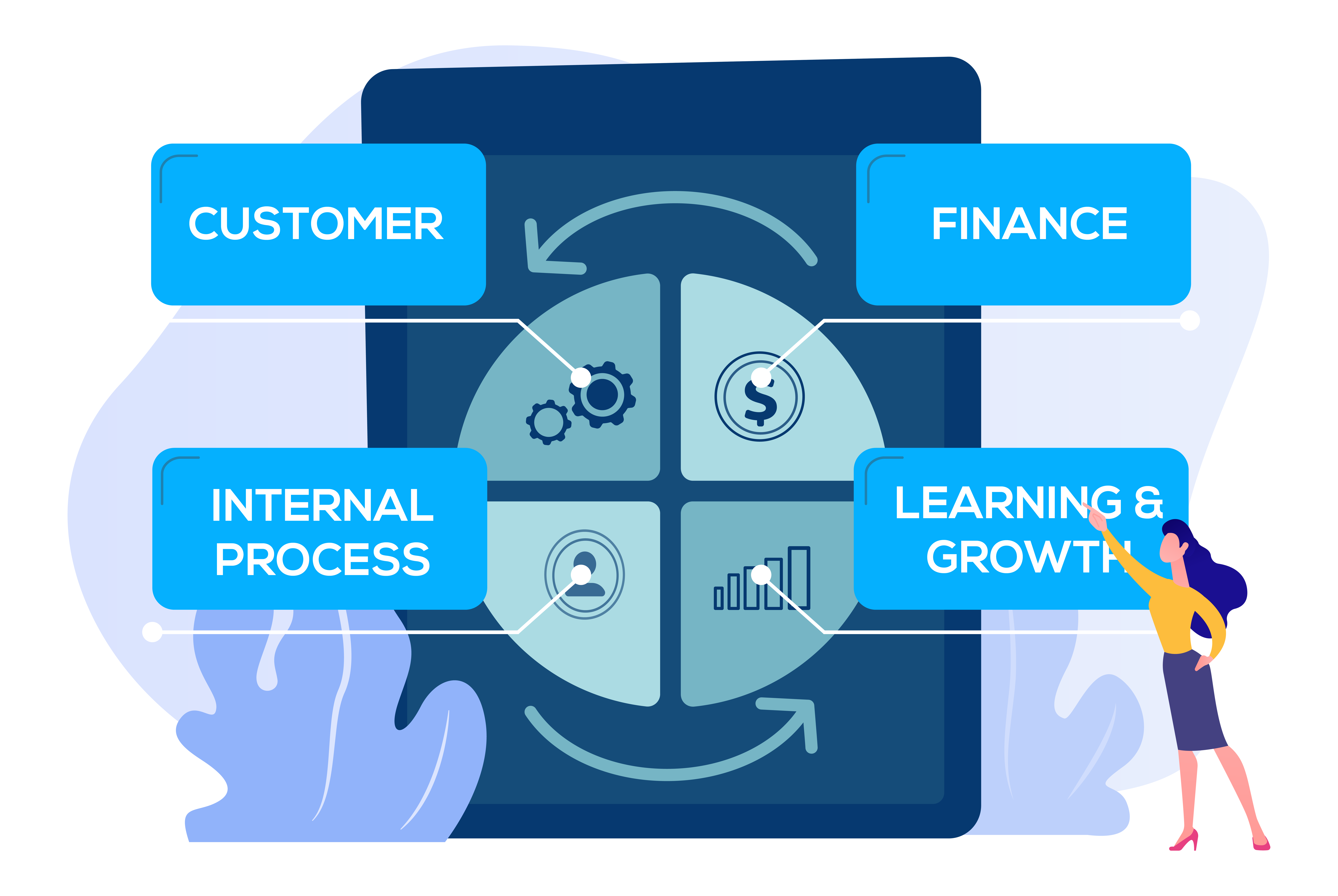

A strategy map is a straightforward diagram that depicts the relationship between strategic goals in a logical, cause-and-effect manner. As it is used to swiftly communicate how value is created by the organization, it is one of the most effective components of the balanced scorecard technique. Every employee may see how they contribute to the accomplishment of the organization's goals with a well-designed strategy map.
Strategic goals and measures are included in a balanced scorecard. Actuals and objectives will be part of the measurement. We must choose the right strategic initiatives/projects if we are to meet the goals.
fruiStrategy helps you to define dynamic strategy map which include time dependent objectives, drill down to stories, drill down to performance numbers, send action messages for performance gaps, and monitor business performance holistically.
Value gap is the performance gap that cannot be filled by current resources or abilities to meet strategic projections. Value gaps can be determined by product/service categories or geographic locations. The predicted revenue gaps are often filled by strategic goals, projects, and actions. During the execution of the plan, the methodical description of value gaps and how they will be closed can provide invaluable knowledge.
The value gap closure performance can be recorded as part of BSC reporting and hence you can keep the track of link of strategy plan to execution.
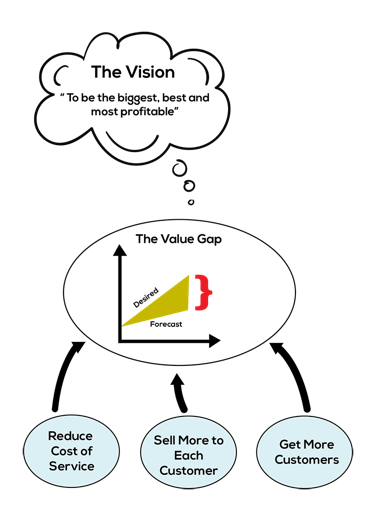
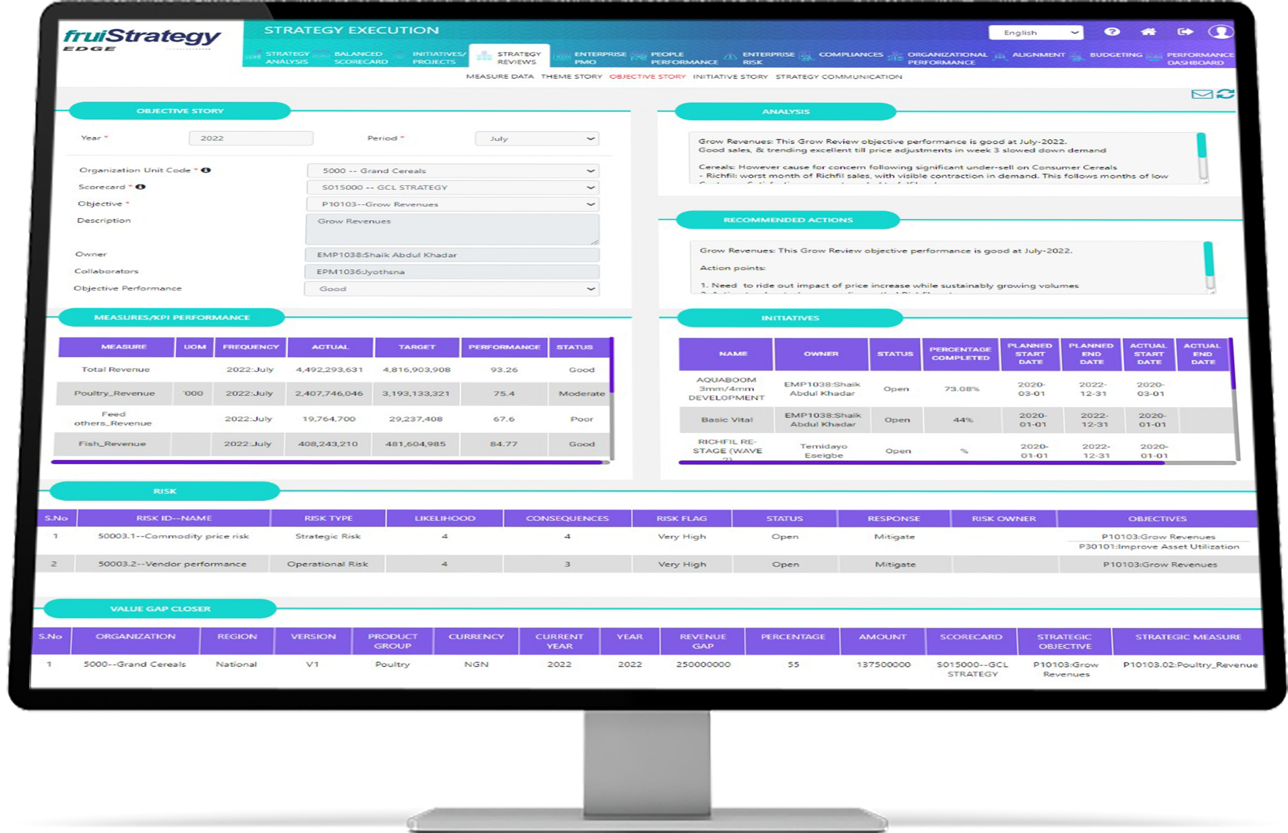
The management of an organisation evaluates the effectiveness of a chosen strategy's implementation, its level of success or failure, and the performance of the entire organization through the process of strategy review.
Reporting of KPI actuals, initiative performance, people performance is the key process in all organizations. The process will be simplified by robust automation to any ERP or other systems.
The review meetings are decision-driven meetings that focus on the big picture rather than tactical issues and identify new value-creating opportunities within a business.
The performance of an organization's overall strategy may be monitored and improved by using a range of reports that can be retrieved from the balanced scorecard. A report with all of the scorecard's indicator values, a report with data on leading and lagging indicators, a summary of all initiatives with budget and duration, a report with goals, initiatives, and the people in charge, a report with the mission, vision, core values, and strategic themes, a report with all of the scorecard's strategy maps, and any other customised reports that are required are just a few of them.
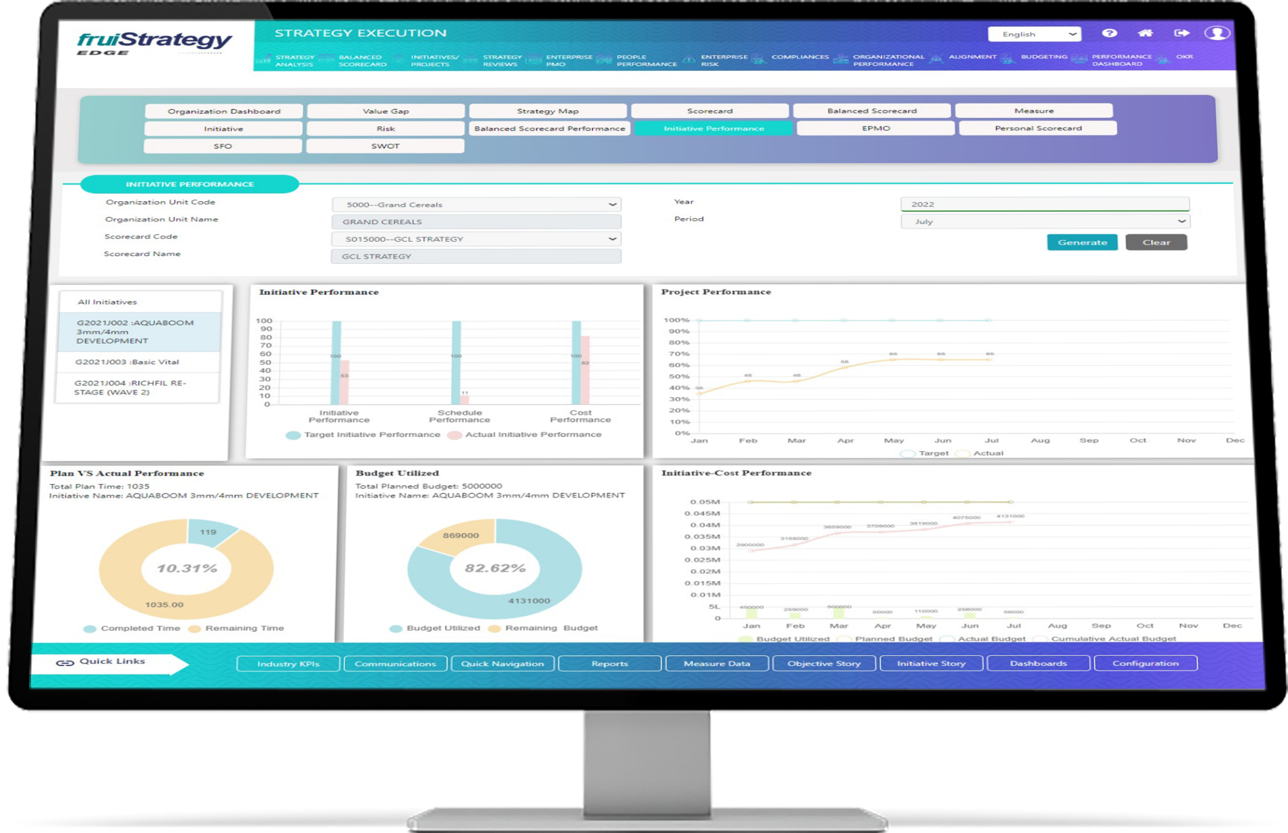
Industry Standards
Industry Standards
Industry Standards
The process of developing a strategy includes strategy analysis, which must be connected to the execution of the strategy. The module enables linking of the implementation of the strategy plan. The solution includes all essential tools for strategy analysis, such as SWOT, PESTEL, Porter's Five Force Analysis, cause and effect, scanning, and others.
To discover strategies to close value gaps through strategic initiatives, objectives, and other strategic actions, keep strategic projections by product group or service group in place. Value gaps can be determined by product,service, categories, and geographic locations.
The most important part of executing a strategy is the strategy map, which shows the causal relationships between the strategic goals. Cause and effect analysis can be related to a strategy map. Departmental strategy maps, business unit strategy maps, and the overall organisational strategy map can all be updated together.
A balanced scorecard is a framework that converts a company's strategy into a list of goals, measures them, and helps the company align itself with those goals through its planning and control procedures. Establish ownership, viewpoints, topics, goals, measures, and initiatives.
Describe how all organisational units, including corporate offices, business units, support units, and departments of business units, are aligned with respect to strategic objectives, business processes, people, systems, and structure.
Describe how business unit departments should work with HR, Finance, IT, and other corporate support units to achieve the corporate unit's strategic goals and operational goals.
For business units and corporate units, define Goals, Key Activities, and desired outcomes (OKR) to achieve excellence in attaining OKR results as part of strategy execution in alignment with BSC framework. The organizational goals, Objectives, Key Results, initiatives, OKR performance reporting, OKR reviews, overall organizational performance can be automated.
A key performance indicator is a quantifiable figure that shows how well a business is accomplishing its main goals. KPIs are used at many levels to assess their effectiveness. These KPIs could be centred on an organization's departments' overall performance and operational procedures. In addition to default KPIs, "fruiStrategy" can offer the ability to build KPIs.
The explicit goal of strategic initiatives is to close the performance gaps established by the plan. A strategy cannot be carried out with only one initiative. It necessitates a number of actions. With "fruiStrategy," businesses can better connect their initiatives with various strategic goals that are geared at accomplishing those goals.
You can save the tale of themes, objectives, and initiatives that follow a specified format using "fruiStrategy." With an objective/theme/initiative story, you may examine a single strategic objective, topic, or initiative along with all of the accompanying data, track data over time, and share the findings with different recipients by saving data.
Find the optimum fit for strategic alignment by tying strategic projections to business planning. Strategic predictions can be used to generate financial statements as part of the budgeting process, which will then drive the entire budgeting process to achieve the desired result.
Manage every portfolio, programme, and project in alignment with the strategic goals and balanced scorecard. It is possible to maintain the scoring system used to assess the performance of specific projects, programmes, and portfolios as well as to report on the results on a regular basis.
Determine the hazards that are tactical, operational, and strategic in nature. Establish and maintain risk management and mitigation methods with allocated funds. An organisation can effectively manage risks by conducting a periodic review of the risk status.
Use a calendar that is well-organized, has planned events, reminders, attached documents and formats, and ownership of compliance management to handle all compliance obligations and their renewal requirements. Organize and execute all the compliance related activities.
Via the alerts mechanism, all strategic communication and alarms may be controlled effectively. The emails and texts can be used to provide information, serve as reminders, or request further action. The actions can be completed, and the open points list can be frequently examined.
Analyze projects, measures, risks, value gap analysis, and reports for balanced scorecard performance using performance dashboards. Initiatives, measures, objectives, and the overall balanced scorecard can all be tracked in the reports.
It is possible to closely monitor the evolving strategies and strategic directions, and any modifications to those strategic directions can be updated through a strategy refresh system. The most relevant and the right strategies are always at check.
The measure values for actuals can be reported using a variety of data sources, including manual excel sheets, ERP, budgeting systems, and line-of-business systems. All the data sources are seamlessly integrated and the required data can be anlalyzed.
With adequate security management, the user management can be established to control access to all modules, sessions, and reports. necessary access rights for the modules as needed.
Create operational budgets using general ledgers, departments, WBS, profit centres, cost centres, and driver-based modelling. Create predicted financial statements and budgets for capital expenses.
To deliver integrations, intelligent notifications, and performance monitoring, the system is powered by process mining, AI & ML models, IoT integrations, and RPA.
In a single platform, you may access all the tools, business procedures, review procedures, alignment procedures, and performance management procedures.
Complete solution enabling strategy execution through the Objectives and Key Results (OKR) Methodology and the "Execution Premium (XPP)" of Dr. Kaplan and Dr. Norton.
Establish ownership, strategic objectives, metrics, and targets for the Balanced Scorecard, as well as perspectives and themes.
Establish your objectives, key activities, and results, then monitor your progress to ensure that your strategy is being properly executed.
Access to KPIs and industry best practises that can be utilised to accurately construct metrics for strategic objectives.
Compare performance against targets and actuals for each metric to the performance of similar business units, the performance of the industry, and the ideal target values.
Monitor strategic projects by reporting on their progress on a weekly, monthly, or quarterly basis, along with updates on their progress in terms of budget and schedule.
Manage the progress of the alignment index by aligning the organisation with the corporate to business unit, support services, business processes, and strategic goals.
Manage corporate PMO activities with proper portfolio, programme, and project definitions and connect them to the strategic management process in a seamless manner.
Identify and manage risks and eliminate them in the strategy execution. Improve risk control through proper budget allocations.
Manage all compliance requirements through one setup and get regular alerts to revise compliance and other statutory requirements.
Get the overall organizational performance and continuously review the overall performance index to help see the direction strategically.
Perform strategy analysis with all best practices and identify strategy indicators to link to the strategy execution to test the hypothesis continuously.
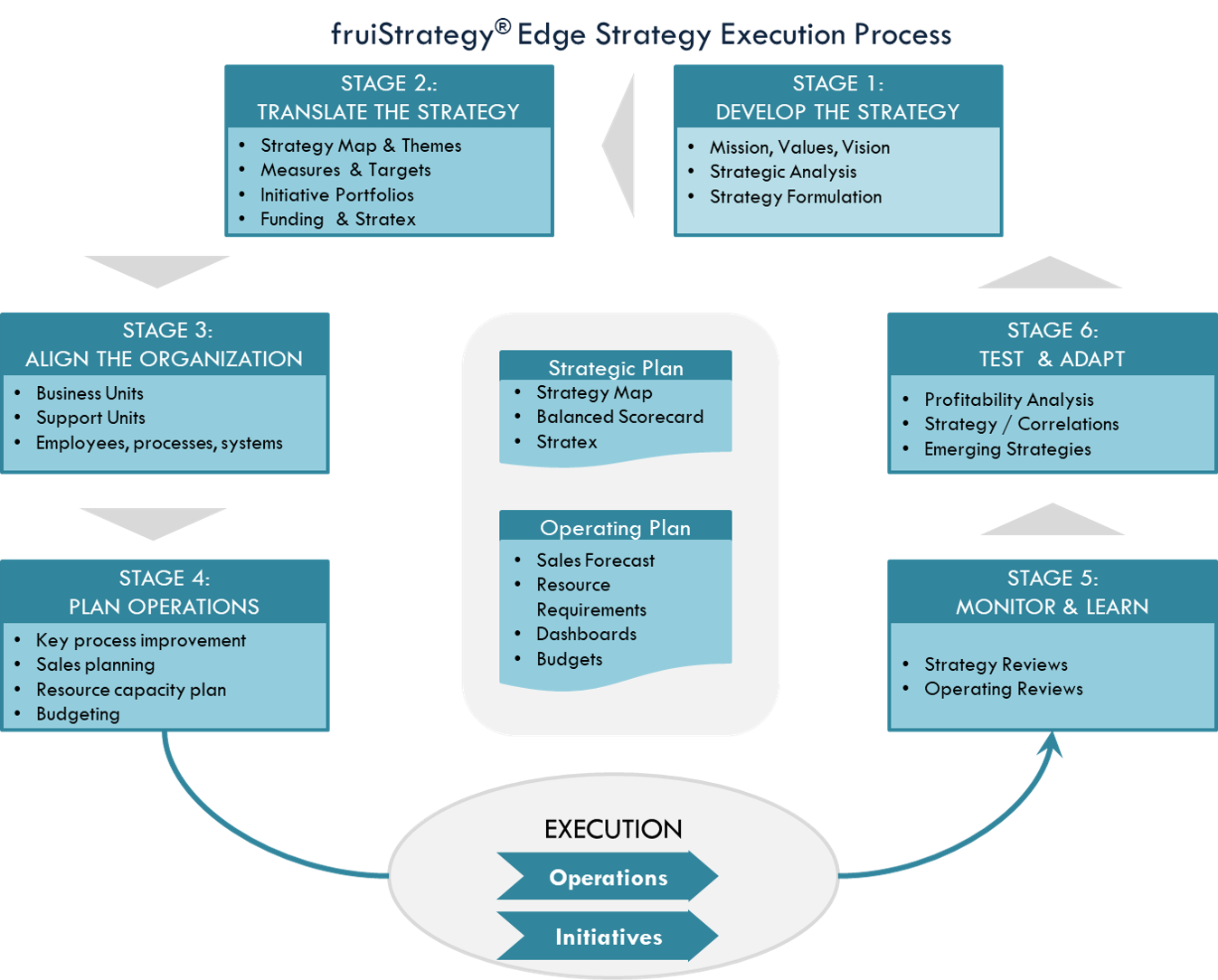
Perform strategy analysis, validate strategic choices, and formulate strategy to take the organization from current state to future state
Align everything in the organization including corporate units, business units, people, systems, processes, and everything else
Execute operations efficiently and effectively, and complete projects successfully to achieve desired results and business growth
Test the strategic assumptions regularly with the results to achieve strategic outcomes and quickly identify and adopt emerging strategies
Translate strategy into strategy maps, balanced scorecard, initiatives, and fund them to executive desired results and key capabilities
Plan operations to achieve key process improvements, integrated demand and supply plans, budget, tactical and operational plans
Monitor the business through effective strategy review to ensure strategy execution and alignments and efficient operational reviews
Consulting for all steps in strategy execution which include strategy planning, strategy translation, strategy reviews, PMO processes, risk management, strategy refresh, personal scorecards and others.
Implementation of strategy execution process aligning with all best practices which include Execution Premium, OKR, Enterprise PMO, Enterprise Risk Management, Personal Scorecards, and Strategy Analysis tools.
Integration with all complementing solutions and data sources to have seamless flow of data to make data available on time to enable better decision making.
Software solution which is comprehensive, easy to implement, easy to maintain empowered by latest technologies which include AI/ML, process mining, mobility, API enabled.

© 2023 - Data Labs America all rights reserved.
